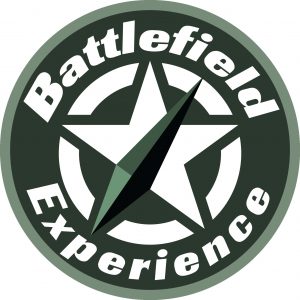The post The GI Who Hurled His Rifle To The Germans. appeared first on World War Media.
]]>First Lieutenant Werner J Meier, from IPW (Interrogation of Prisoners of War Team) was probably the most respected senior officer in 501st Reg HQ. Meier really knew how to stimulate the morale by offering his liquor rations to the men, especially in Bastogne.
Every move he planned was very thought about and he went by the book only when it would save lives. He was a soldier’s soldier. According to John Primerano from New Hampshire, Meier always called the switchboard when they were short of phones but one day, he didn’t. Second Lieutenant Steve Puiszis, Meier’s assistant, walked up and ordered John to go out there and check if the Lt had disconnected or lost his phone because they could not reach him. When he asked who was going with him, Puiszis replied ” Nobody!”
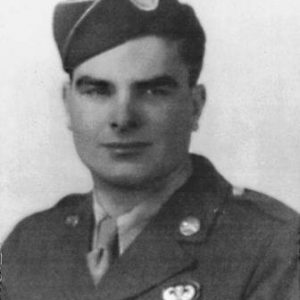
Pfc John Primerano
Indignantly, Primerano glimpsed ammunition, supplies and communications equipment being loaded on trucks and everybody seemed to be preparing to leave. Without the intention to ignore a direct order and frustrated by the idea of being send out alone John muttered “Well, Jesus! Don’t forget me, don’t leave me behind.” Earlier, another section was decimated on the same road he was running, searching for the Lieutenant. Finally, after a one mile sprint, John found that the phone was gone. Realizing that he had risked his life for nothing, he got furious that he possibly also would miss the trucks.
On the way back, the outlines of four men emerged from the dark stretched woods, coming down the road toward him. “ Ducking down behind a tree, I swung my rifle from my shoulder and tried to lower my breath. Three of them were holding their hands over their heads, they were prisoners, escorted by a soldier from A Company. ‘Finally! I found somebody’, the paratrooper said, ‘You are going to have to take these guys back.’ ’Bull!’, I replied, ‘I just came here to check about a phone, I have a truck to catch.’ ’My company commander instructed me to hand these prisoners to the first American I’d see. I must get back on the double because A Co is in one hell of a fight. The sergeant here understands a bit of English’, he finished and then hurried back the same way he came.”
Primerano pointed his rifle at the prisoners and led them towards the trucks. When they reached the nearest junction, the Germans started to zero in on the crossroads with heavy artillery and mortars and forced the four bodies down to the snow covered road. John kept looking up holding his rifle pointed at the POW’s to make sure they didn’t escape. He then informed the sergeant that they were going to make a run for it and that the first one who stopped, would be shot.
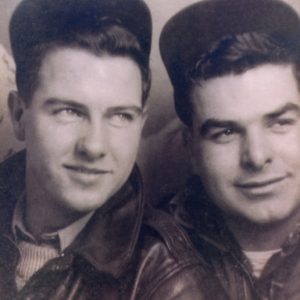
“ I Said ‘Let’s go ..!’ and we ran like hell, but one of them stopped to pick up the mess kit that he just had dropped and I shouted that he was now going to get it. The sergeant translated while we continued. The trucks were just pulling out when we arrived and we bolted after them as fast as we could.” Directly upon them, a Panther tank was firing and the sunken road they were on was lower than the muzzle of the tank could depress. Shells were coming in overhead. “ We made it through the crossfire and had moved close enough to the trucks to make a running jump, to pull ourselves aboard. The Germans leapt onto the bed of the truck first. I couldn’t climb up while carrying a rifle, so I hurled it onto the truck. One of the prisoners caught it. Fortunately they were all so afraid of being killed by their own artillery fire, they just wanted to get out of there and so passed on my rifle to one of the other Americans aside of them. I was relieved to see he didn’t use it what is was built for.”
When they arrived in Bastogne, John turned in the prisoners and took off to find Lt Puiszis. “You were going to leave me there?” , John hollered at him. “All he did was shrug and then said ,’In all of the confusion I must have forgotten about you.’ I called him every name that crossed my mind. Officers should never forget about their men.”
Shortly after, Lt Meier was promoted Captain and won a pass home in February 1945. When reporting for duty again, three months later, Japan had surrendered. John Primerano injured himself by falling down face first while visiting the sunken road in 2012. This formerly unnamed track, a mile north-east of Bizory, is now baptized ‘Purple Heart Road.’
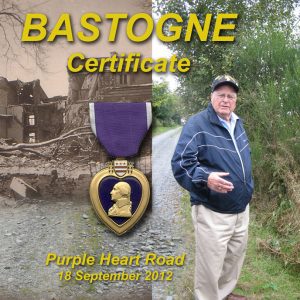
Courtesy of Erwin Janssen
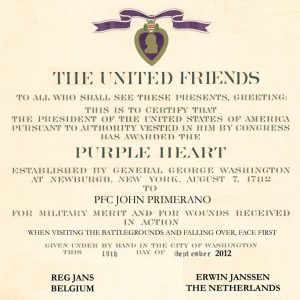
Source: John Primerano/ Cailin Casey/ Erwin Janssen
The post The GI Who Hurled His Rifle To The Germans. appeared first on World War Media.
]]>The post The P-47 Crash at Bastogne appeared first on World War Media.
]]>During the Battle for Bastogne, on December 30 1944, P-47 fighter pilot Harry Krigg made an emergency exit out of his aircraft and landed leg broken in no-mans-land.
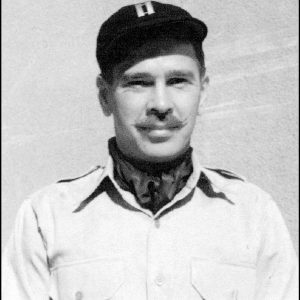
Shortly after Harry hit the snowy ground, 3rd Bn 506 PIR 101 Abn Medic Johnny Gibson managed to pull him into safety.
In this video, WWII historian Reg Jans tells the story.
The post The P-47 Crash at Bastogne appeared first on World War Media.
]]>The post The Bell That Came Home appeared first on World War Media.
]]>The day after the 502nd PIR had successfully cleared the town of Bourcy, five miles north-east of Bastogne on 17 January 1945, radioman Pvt Alden Todd and his buddy from 2nd Platoon F Co Frank Marchese were sent out on foot to participate the organized victory parade at the main square in the city. Both were to represent their unit at the Medal Award Ceremony where their Regimental Commander ‘Silent’ Steve Chappuis , who was already awarded with a DSC by General George Patton on 30 Dec 1944 at the 502 HQ at Rolley Castle, would receive a Silver Star for his outstanding leadership.
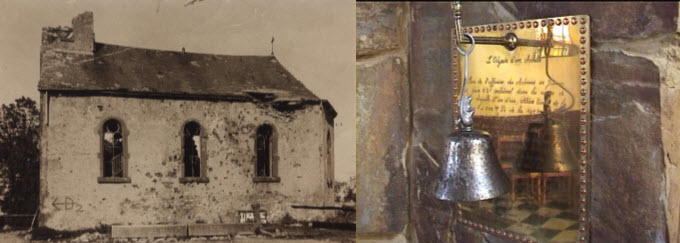
In the early hours on the 18th, the two Five-O-Deuce delegates walked down the N30 towards the battered town center and made a brief stop at Foy . Four days back, a temporary Aid Station was set up at the Sainte Barbe Chapel. As some minor medical activity was still noticeable, they wanted to check upon their wounded buddies. On their way out Todd found a small ‘Altar Bell’ covered by the debris from the steeple. ( In Belgium, an altar bell is traditionally used by the priest or his acolyte to notify the people to stand up or sit down during a Catholic service). Todd kept it and took the Bastogne souvenir to the United States . For almost forty years, the Foy-bell served as a ‘sick’ bell at Alden’s home in New Jersey. Anytime someone was in bed being ill, he or she could use the bell to ask for help, water , medicine or food.
Bernard Lambert was in charge of the parish of Foy when he received a letter from Alden Todd in 1984 telling him the Bastogne veteran wanted to return to Foy. Dean Lambert was even more surprised when Todd showed up at an organized dinner with Frank Marchese and several other war buddies and returned the ‘Altar Bell’.
Todd’s bell is still on display near the altar in Foy. Unfortunately, the chapel is mostly locked and inaccessible to the public.
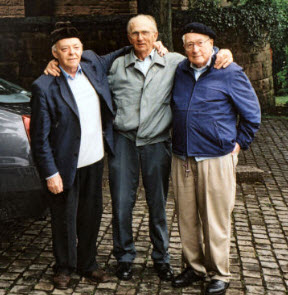
Bernard Lambert-Charles Kohler-Alden Todd (Courtesy of the Commune of Noville)
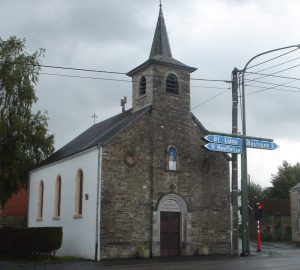
The post The Bell That Came Home appeared first on World War Media.
]]>The post To the German Commander: NUTS! appeared first on World War Media.
]]>On December 22, 1944, at about 11:30 in the morning, a group of four German soldiers, waving two white flags, approached the American lines using the Arlon Road from the direction of Remoifosse, south of Bastogne. The group consisted of two officers and two enlisted men. The senior officer was a Major Wagner of the 47th Panzer Corps. The junior officer, Lt. Hellmuth Henke of the Panzer Lehr Operations Section, was carrying a briefcase under his arm. The two enlisted men had been selected from the 901st Panzer Grenadier Regiment. – By Kenneth McAuliffe
The Americans defending in that location were members of F Company of the 327th Glider Infantry Regiment, 101st Airborne Division. The Germans walked past a bazooka team in a foxhole in front of the Kessler farm and stopped in front of the foxhole of PFC Leo Palma, a B.A.R. gunner. Palma described the officers as wearing long overcoats and shiny black boots. Lieutenant Henke, who spoke English said, “I want to see the commanding officer of this section.” Palma was at a loss for words, but Staff Sergeant Carl E. Dickinson who had been manning a position nearby walked out to the road and called the group over to him. The Germans explained that they had a written message to be presented to the American Commander in Bastogne.
SSGT Carl Dickinson 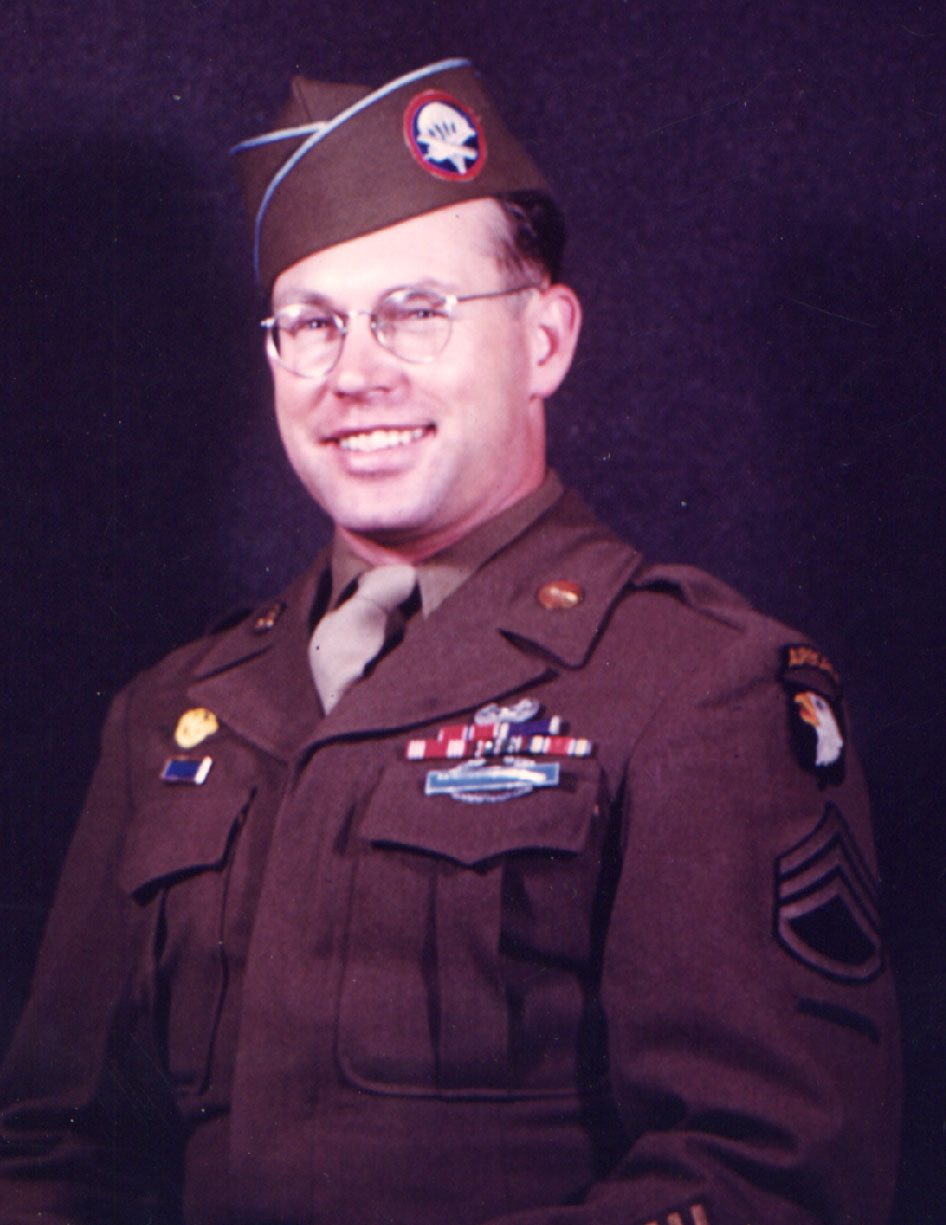
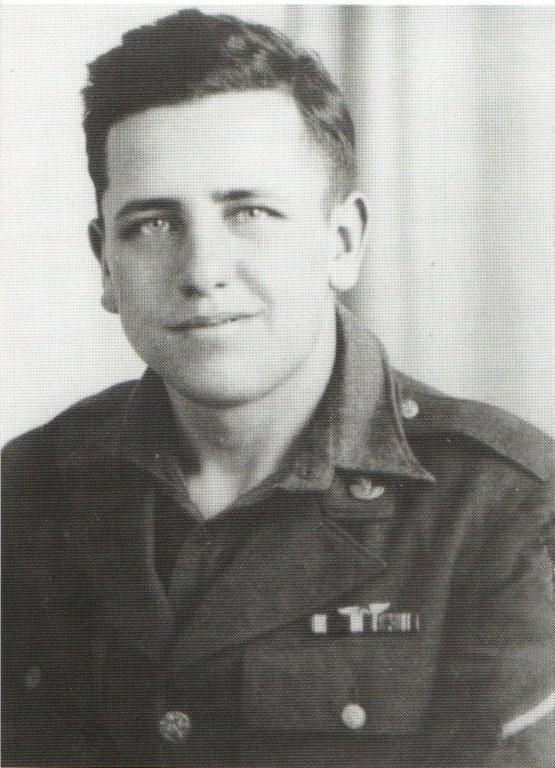 PFC Ernest Premetz
PFC Ernest Premetz
Henke said they would consent to being blindfolded and taken to the American Commanding Officer. In fact, they had brought blindfolds with them. Henke blindfolded Wagner and Dickinson blindfolded Henke. As the blindfolds were being applied, Dickinson was joined by PFC Ernest Premetz, a German-speaking medic of his platoon who offered to serve as an interpreter. However no interpreter was needed.
Dickinson and Premetz left the two German enlisted men there and took the two German officers to the Kessler farmhouse. Tech. Sgt. Oswald Y. Butler, Acting Platoon Leader of the 1st Platoon, and Lt. Leslie E. Smith, Platoon Leader of the Weapons Platoon, told them to take the blindfolded officers to the F Company Command Post. They took the two German officers on a roundabout route to the Command Post of F Company, 327th GIR, which was a large foxhole located in a wooded area about a quarter mile away. Shortly after arriving at the command post, they were joined by Capt. James F. Adams, the F Company Commander, who had been at a forward observation post when he was notified of the arrival of the Germans.
When Adams arrived, 1st Sgt. Constantine A. Pappas informed him that the German major had already presented a written message. The F Company Executive Officer, Lt. William J. Herzke, was on the phone, reading the message to their Battalion Command Post in Marvie. The 2nd Battalion Command Post then notified the 327th Regimental Headquarters in Bastogne. Col. Bud Harper, the 327th Regimental Commander, was not there; he was out inspecting his unit’s positions. The senior officer present was the Regimental Operations Officer, Major Alvin Jones. Maj. Jones notified the Division Headquarters in Bastogne and asked for instructions. He was told to retrieve the message and bring it to the Division Headquarters. He drove to the F Company Command Post and was given the message. The two blindfolded officers were kept in the woods adjacent to the foxhole Command Post.
Upon receiving Maj. Jones’ phone call at Division Headquarters, the Acting Chief of Staff, Lt. Col. Ned Moore entered Brig. Gen. Anthony C. McAuliffe’s sleeping quarters adjacent to the communications center. Moore wakened McAulliffe and told him, “The Germans have sent some people forward to take our surrender.” Moore recalled that Brig. Gen. McAuliffe, still half asleep, said “Nuts!” and started to climb out of his sleeping bag.
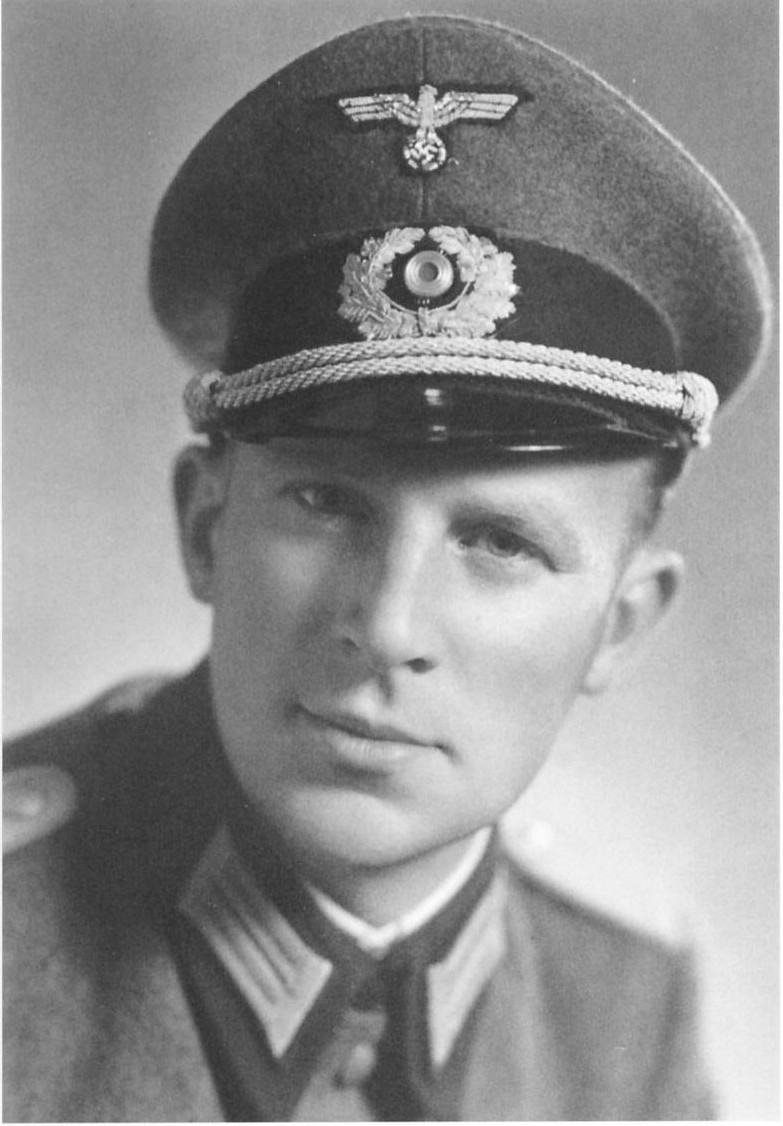
Lt Hellmuth Henke
Moore then went back out into the Communications Center where he briefed the rest of the Division staff of the on-going situation, including telling them of McAulliffe’s remark of “Nuts!”
When Maj. Jones arrived with the message, the staff looked at it before taking it in to McAulliffe.
The German surrender demand was typewritten on two sheets. One was in English, the other in German. They had been typed on an English typewriter as indicated by the fact that the diacritical marks required on the German copy had been entered by hand.
This is the English version of the message:
“December 22nd 1944
To the U.S.A. Commander of the encircled town of Bastogne.
The fortune of war is changing. This time the U.S.A.
forces in and near Bastogne have been encircled by strong
German armored units. More German armored units have crossed
the river Ourthe near Ortheuville, have taken Marche and
reached St. Hubert by passing through Hompre-Sibret-Tillet.
Libramont is in German hands.
There is only one possibility to save the encircled
U.S.A troops from total annihilation: that is the honorable
surrender of the encircled town. In order to think it over
a term of two hours will be granted beginning with the
presentation of this note.
If this proposal should be rejected one German
Artillery Corps and six heavy A. A. Battalions are ready
to annihilate the U.S.A. troops in and near Bastogne. The
order for firing will be given immediately after this two
hours’ term.
All the serious civilian losses caused by this
artillery fire would not correspond with the wellknown
American humanity.
The German Commander.”
The Division Operations Officer, Lt. Col. Harry Kinnard recalled that McAulliffe initially asked, “They want to surrender?” Moore told him, “No sir, they want us to surrender.” McAulliffe arose and erupted in anger, which shocked those looking on. He took the paper, looked at it, said “Us surrender, aw nuts!” and dropped it on the floor. Maj. Jones was dismissed. McAulliffe then left the Headquarters to go congratulate a unit on the Western perimeter that had successfully taken out a German road block earlier that morning.
When Jones left the Headquarters, he went back to the F Company Command Post and spoke with the two German officers. When he returned to his Regimental Headquarters, he phoned the division headquarters.
Upon returning to the division headquarters, McAulliffe was informed that Jones had phoned to say that the two German officers were still waiting at the F Company Command Post. Since they brought a formal demand they felt they were entitled to a formal reply and they were to return to the German lines two hours after delivering their message.
McAulliffe asked that Col. Harper be summoned to the Division Headquarters. Harper, who was still inspecting his units’ positions, was contacted by radio.
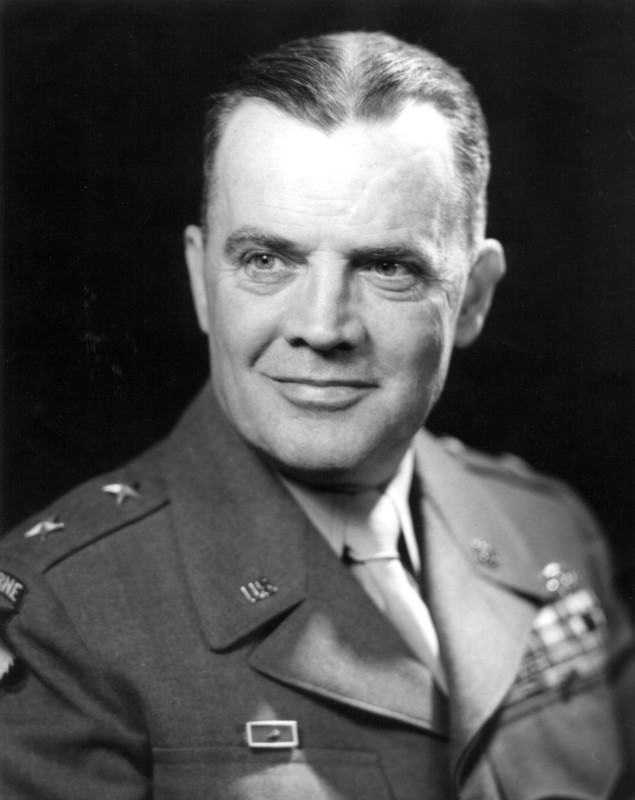
Brig Gen Anthony C McAuliffe
When Harper arrived at the Headquarters, he was asked to wait outside of the closed door to McAulliffe’s quarters. Inside, in the presence of his staff, McAulliffe wondered aloud, “Well, I don’t know what to tell them.” At that point, Kinnard said, “What you said initially would be hard to beat.” McAulliffe asked “What do you mean?” Kinnard, said, “Sir, you said nuts.” All members of the staff enthusiastically agreed, so McAulliffe wrote it down on a message pad and said, “Have it typed up.”
The reply was typed up, centered on a full sheet of paper. It read:
“December 22, 1944
To the German Commander,
N U T S !
The American Commander”
McAulliffe dismissed the staff and asked that Harper come in. McAulliffe initially toyed with him by having him stand in front of Higgins and himself. McAulliffe showed him the surrender demand and asked if he had already seen it. Harper said no. McAulliffe asked him to read it and suggest how it should be answered. Harper was surprised by the request and quickly tried to draft a reply in his head. At that moment, a clerk-typist entered the room and handed McAulliffe a sheet of paper. He looked at it and then showed Harper the typed “NUTS” reply, asking him if he thought that was a proper reply. Harper read it and started laughing. McAulliffe asked Harper to personally deliver the reply to the Germans, cautioning him not to go into the German lines.
Harper took the reply and drove to the F Company Command Post. Harper told Henke that he had the American Commander’s reply. Henke asked if it was written or verbal. Harper answered it was written and he put it in the hand of the blindfolded German Major. Henke asked about the contents of the reply because if it was affirmative, they were authorized to negotiate further. Harper said, “The reply consists of a single word, NUTS!” Henke, not understanding, asked, “Is that reply negative or affirmative?” Harper said, “The reply is decidedly not affirmative”, adding, “If you continue this foolish attack, your losses will be tremendous.” Henke translated for the Major. The Major nodded.
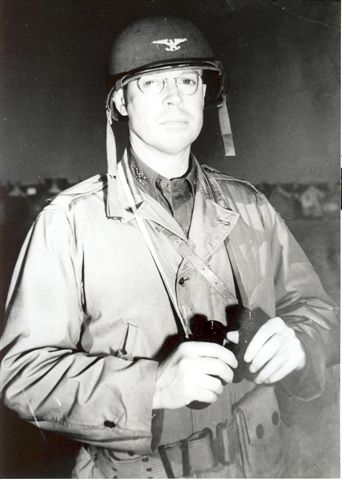
Col ‘Bud’ Harper 327 GIR
The two blindfolded German officers were then driven, again by a roundabout route, back to their entry point at the Kessler farm. At the farm, the group was rejoined by PFC Premetz. The blindfolds were removed and the Germans opened and looked at the reply. They asked, “What does this mean?” They obviously didn’t understand the American slang. Harper and Premetz discussed how to explain it. Harper suggested, “Tell them to take a flying s**t!” Premetz thought about it, then straightened up, faced the Germans and said, “Du kannst zum Teufel gehen.” He told Harper it meant “You can go to Hell.” Then Harper said, “If you continue to attack, we will kill every goddamn German that tries to break into this city.” Henke replied, “We will kill many Americans. This is war.” Harper then said, “On your way Bud, and good luck to you.” After Henke translated, the major acknowledged. They saluted and the Germans started to walk away. Harper angrily called out to them, “If you don’t know what I am talking about, simply go back to your commanding officer and tell him to just plain, ‘Go to Hell’.” After Henke translated, the major got angry and stormed off. As he passed Palma’s position, he threw his blindfold and Palma caught it. Palma wrote that he didn’t realize the historical importance of that blindfold. He later used it to clean his B.A.R. and threw it away!
The German party returned to their lines. Capt. Adams recorded the time as 1400 hours.
While watching the Germans leaving, Harper began to regret losing his temper, fearing that his attitude may increase the intensity of the attack on his positions. Fortunately, the threatened artillery barrage never happened. Instead, the German Luftwaffe was added to the attack, bombing the town at night.
According to a narrative written by Hellmuth Henke, when the German officers returned to their vehicle, while they were putting their pistol belts back on, Maj. Wagner removed his pistol from his trouser pocket and placed it in its holster, stating that he wasn’t going to get caught without protection.
The two German officers then drove to the 901st Panzer Grenadier Regimental headquarters in Lutrebois. After reporting in, they left to go to the Panzer Lehr Division headquarters located about a mile further south. Just before reaching the Panzer Lehr Headquarters, they saw the car of General von Manteuffel parked by a thicket of trees. Maj. Wagner stopped and reported to the General. They then proceeded to the Panzer Lehr headquarters. General von Luettwitz, the Corps Commander, happened to be there. They presented the “NUTS” reply. Upon hearing the negative reply, General Bayerlein, said it was time to start striking out with the heavy artillery located behind the hill. He was interrupted by General von Luettwitz who stated that the heavy artillery was no longer located there, it had been moved to forward positions past Bastogne. Bayerlein then started to explain how he would attack Bastogne without the heavy artillery, but was again interrupted by von Luettwitz. Von Luettwitz reminded Bayerlein that Bastogne was not his objective and ordered the Panzer Lehr Division to proceed around Bastogne to Rochefort and leave Bastogne to the 26th Volksgrenadier Division.
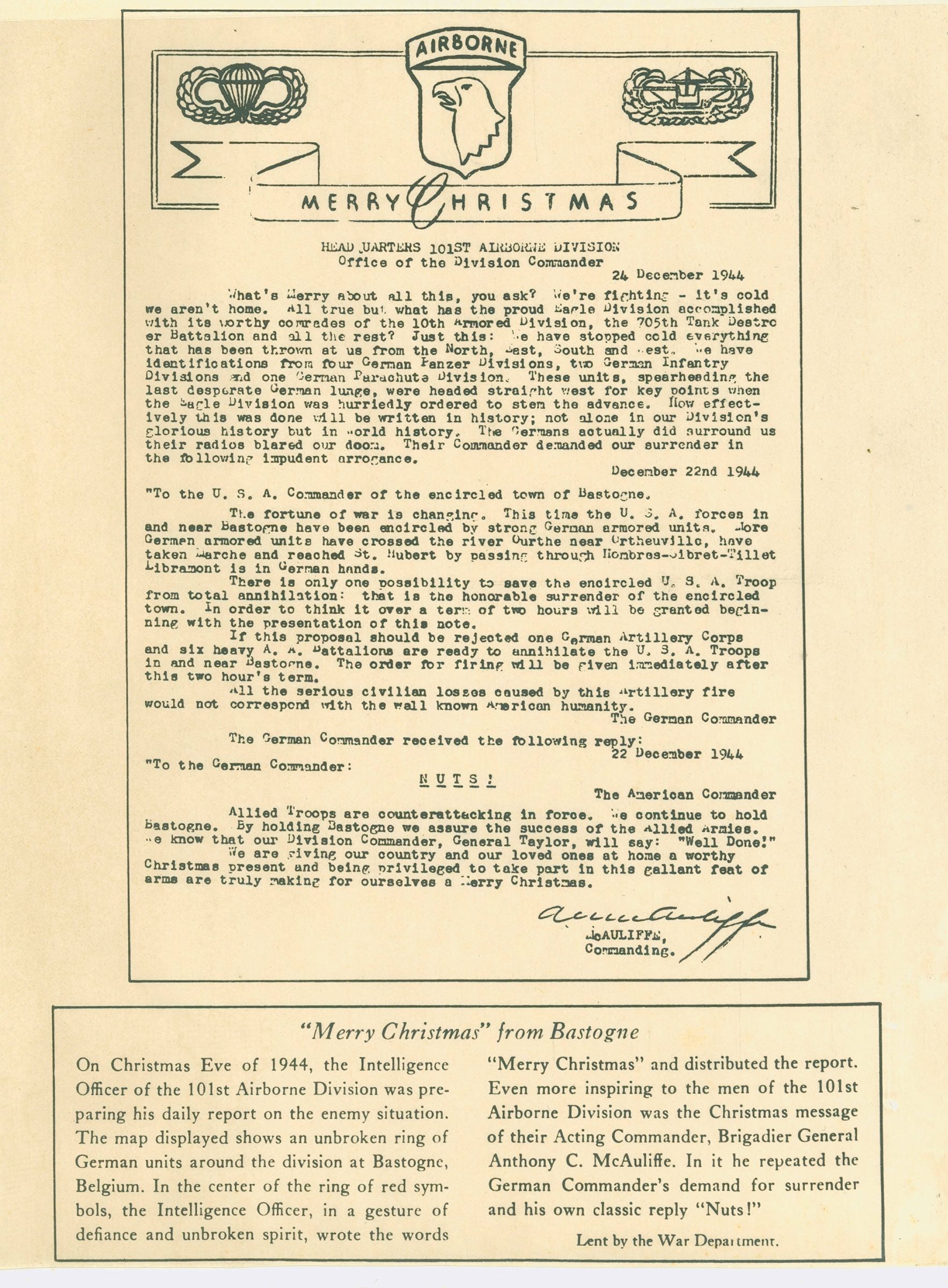
The post To the German Commander: NUTS! appeared first on World War Media.
]]>The post WWII veteran recalls a touching experience during the Battle of the Bulge and discovers the crucifix that changed his life forever. appeared first on World War Media.
]]>“I have been returning to Bastogne for the last thirty six years”, recalls US veteran John Primerano from Exeter, MA. Back in 1944, the then twenty-year old Private First Class Primerano, served in the Regimental Headquarters -Wire Section, of the 501st Parachute Infantry Regiment, 101st Airborne Division. John was also a mapmaker tasked with building geographical sand tables in England and as such missed the Normandy campaign. After making his first combat jump in the Netherlands during Operation Market-Garden, Primerano was then deployed to Belgium at the start of the Battle of the Bulge.
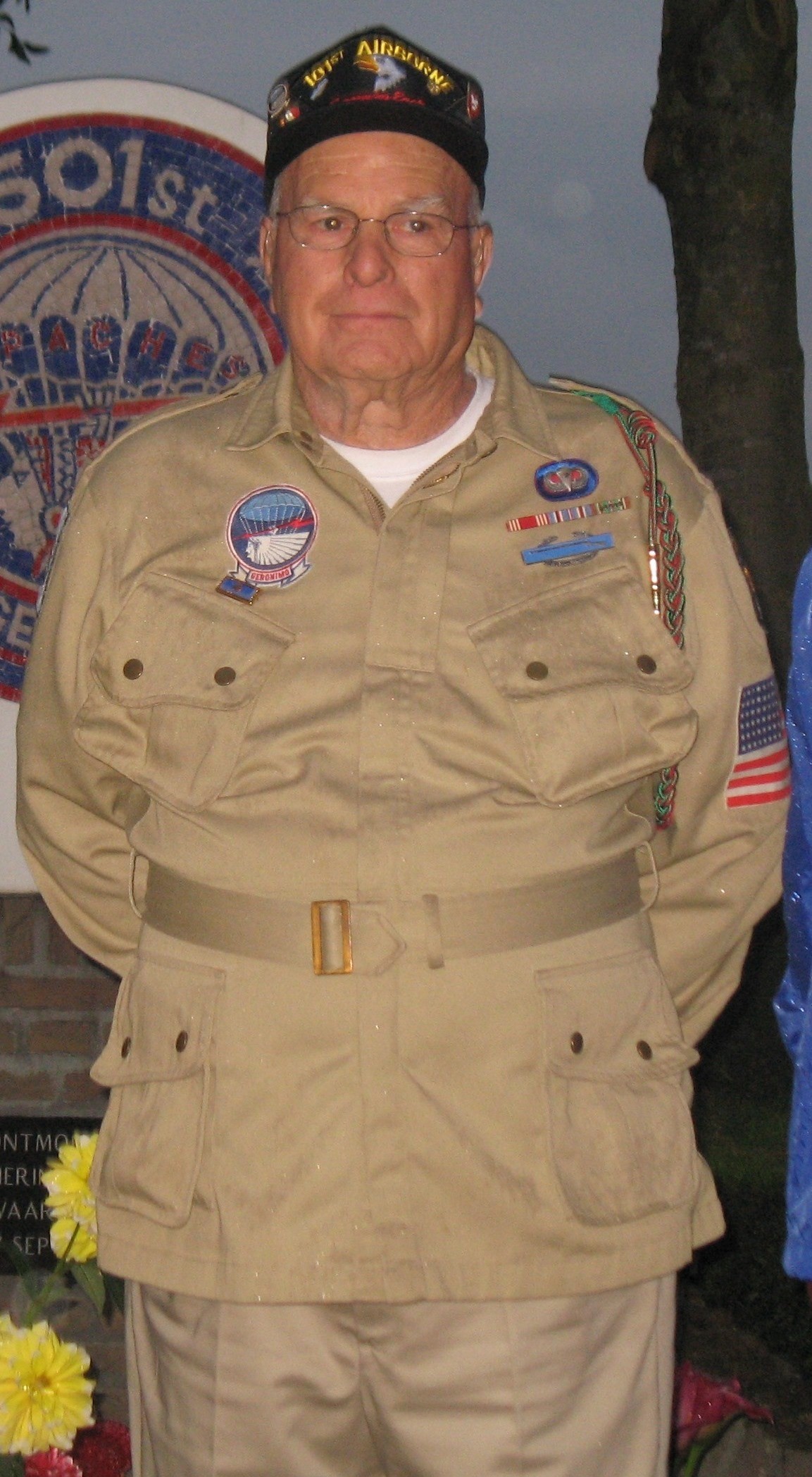
Shortly after his closest friend, Harold J Arnold, died in his arms, battle fatigue started to creep in and Bastogne’s Saint Peter’s Church (situated across the street from the regimental command post) became a considerable part of John’s Bastogne life. “When I left my switchboard at the Seminary School, my hands were shaking and I no longer had the energy to carry on.” John reflected. As Primerano crossed the intersection, pandemonium broke out as a heavy artillery barrage hit the town center. But an eerie silence fell as he closed the heavy oak church door behind him.
“It was like I’d stepped into some sort of vacuum”, he recalls. “I sat down and took my helmet off. I was sweating. Lying on the floor next to me was this big wooden crucifix that had been blown off the wall and the roof had been punctured by incoming rubble. Looking up as I watched the sky clearing suddenly a shaft of intense sunlight came streaming through one of the holes in the ceiling! The beam completely lit up the crucifix! Alone in that church, suddenly I became acutely aware of a warm sensation that I can only describe as a loving embrace followed by a soft voice whispering ‘Don’t worry son…you’ll be fine!’”. From that moment, John’s hands ceased to shake and the energy began to seep back into his body. Picking up his helmet, somewhat stunned, John started back to the CP but as he crossed the road all hell broke loose again, but he was calm and unconcerned, “I knew I was going to make it”.
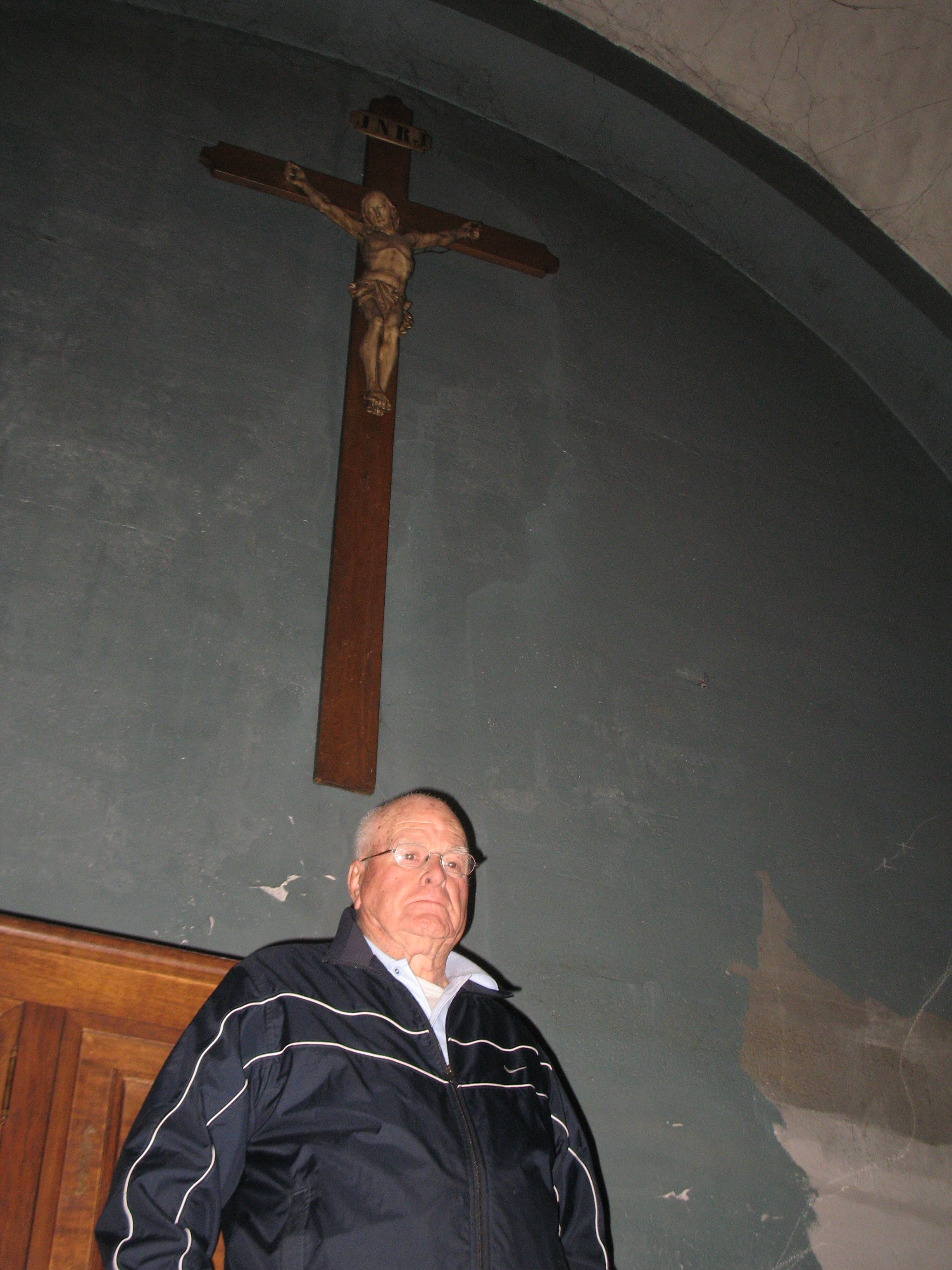
In 2012, John returned to Bastogne and visited Saint Peter’s Church, just like he had done many times before but this time with the help of a local man and a Dutch friend, they discovered the crucifix, the same one he had seen back in 1944, in a small room well hidden from public gaze directly behind the organ. The cross was fixed to the wall of the “Candle Room”. John, eyes transfixed on the simple wooden cross, was visibly moved and choking back the tears declared, “I never imagined that I’d ever see it again…back then, this cross actually changed my life”. It has now become a tradition for Mr. Primerano, to light a candle at the church in memory of his comrades and also to remember that short, intense and inspiring experience in Bastogne during Christmas, 1944.
The post WWII veteran recalls a touching experience during the Battle of the Bulge and discovers the crucifix that changed his life forever. appeared first on World War Media.
]]>The post Dear IRS: Come and Get Me! appeared first on World War Media.
]]>During the Battle of the Bulge, General George S Patton’s Fourth Armored Division broke through the German lines to relieve the pressure on eighteen thousand American troops surrounded in Bastogne. While an evacuation route was established, the Red Ball Express successfully carried out a ground resupply mission providing ammunition, food, winter clothing, blankets and a rather unusual letter… .
-By Reg Jans
In his snow-covered slit-trench just south of the tiny town of Recogne, twenty three your old mortar man Pvt James ‘Pee Wee¹ Martin received his first post from home.
‘There was a mail drop’, Mr. Martin remembers, ‘A truck drove in behind our lines and some overdue letters were distributed’. Jim’s family back in Ohio, had forwarded an official looking envelope to the United Kingdom. Unfortunately, when it reached Ramsbury (England), the paratroopers of third battalion, 506 PIR, had already parachuted into Normandy for D-Day.
The American Postal Service then forwarded the mail to France. Too late. The troopers had already returned to the UK and had jumped into the Netherlands for Operation Market-Garden. ‘That letter has followed me all across Europe and visited every country I had been to’, Pee Wee continues. ’It finally got to me in Bastogne.’
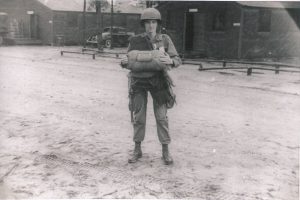
Excited to receive some news from home, Jim opened the envelope but what he found was not exactly what he had expected. ‘It was a letter from the IRS (Internal Revenue Service), Jim remembers, ‘Dear Mr. Martin, we have checked your account and you still owe us USD 200,-. We urge you to settle this immediately in order to avoid any further actions to be taken against you.’, the cheery veteran says.
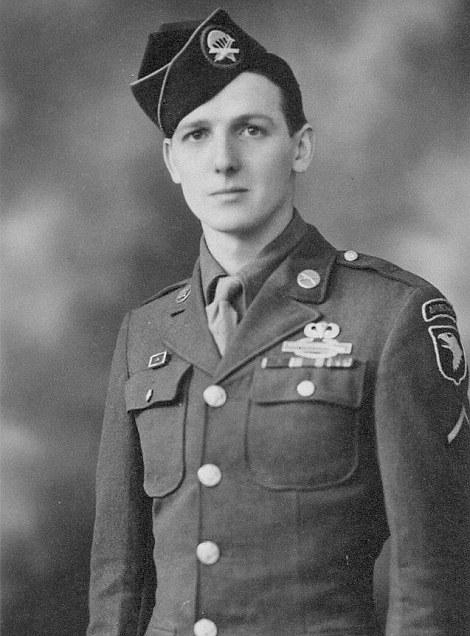
Astonished and slightly perturbed by the uncomfortable message (a motivating letter or Christmas card from home would have been far more appreciated), the ever inspired soldier scribbled back from his freezing foxhole.
‘I wrote the following’, Jim smiles, ‘”Dear IRS, Currently I am sitting on a log in Bastogne, Belgium, with snow up to my butt. The unpleasant news has arrived that you plan to take action against me if I don’t pay immediately. Well, I have a surprise for you: COME AND GET ME!”’.
To temper the mood of the administration, Jim Martin added a few bills of D-Day Invasion Money to it, before returning his answer to the USA.
‘I never heard from them again’, the now ninety five year old trooper chortles.
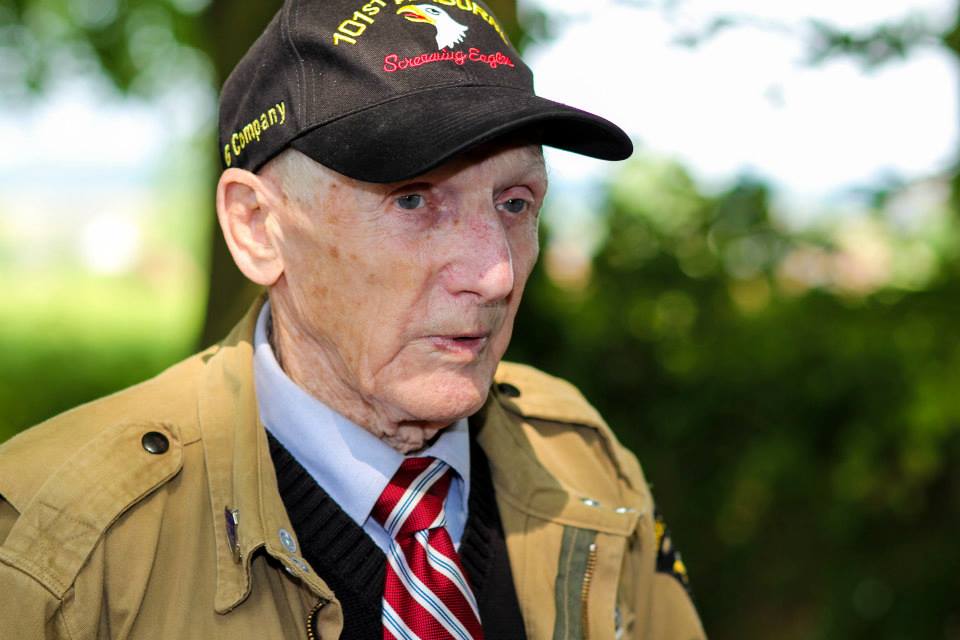

The post Dear IRS: Come and Get Me! appeared first on World War Media.
]]>The post 64 years later: 101st Vet got to eat the meal that was stolen at Bastogne appeared first on World War Media.
]]>With food being scarce during the Siege of Bastogne the defenders of the battered bastion instinctively searched for alternatives to fill their aching stomachs. However, one of these famished men was unable to eat his meal until sixty-four years later.
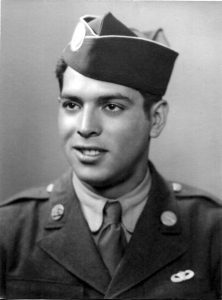
It was a tough winter back in 1944. Almost starving and enduring hypothermia made it nearly impossible for the men of Five-O-Deuce (502 Parachute Infantry Regiment, 101st Airborne Division) to make a stand against the ongoing German attacks and artillery fire. Along with his buddies from B-Company, bazooka-man Amos J. Almeida tried to get comfortable in his trench, just north of the Church at Champs, an outpost to Bastogne.
“The cold was killing us and the lack of food didn’t make it any better.”, he said. “ Then I witnessed an eluded pig being killed by a shell fragment.” (Amos later admitted the pig was shot by a ravenous G.I.). As hungry as a horse, Almeida sprinted toward the dead animal and cut a large piece of meat out of it with his trench-knife.
“I couldn’t use it right away”, he recalled, “I needed to let it rest before I could cook it and eat it. So I hung it on a fence post, next to my foxhole.”. Shortly thereafter Amos was called out to collect some bazooka-ammo south of the village. With shells strapped to his chest and back he returned to his former position an made a terrible discovery. The meat was gone. “Some slick B*****D, stole my food!”.
For the first time ever, in 2006, Mr. Almeida and his family attended the 101stAirborne Reunion. “It was wonderful to see my comrades again after so many years.”, he said. One of the highlights was catching up with his war-pal Tony Lujan. They talked about everything they went through together in WWII but suddenly their conversation faltered when Tony stroke a chord.
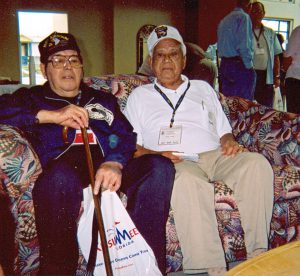
Amos Almeida with Tony Lujan
“He said that he wasn’t that hungry in the Bulge and that some idiot left some meat hanging on a pole in Champs. He had taken and eaten it. It was a darn fine piece of pig.“, Amos choked.
In the spring of 2008 the Almeidas made it back to Europe to walk the steps of B-Company 502 PIR. In Champs a nice surprise was waiting for them. Local inhabitant and WWII enthusiast Raphael Giot had set up A BBQ party for Amos and his gang with bacon and pork chops being the main course.
Finally after 64 years, this fine paratrooper finally could enjoy his piece of pig on the former battleground.
“I want to send the ticket to Tony”, he ended his story.
Pfc. Amos J. Almeida (12/28/1921 – 8/31/2012) was rewarded with a Bronze Star for exposing himself and knocking out an armored vehicle at close range with his bazooka during the Christmas Day breakthrough. By permitting his platoon to engage and repel the German tanks, this heroic act contributed greatly to the successful defeat of the enemy attack and infantry.[/read]
The post 64 years later: 101st Vet got to eat the meal that was stolen at Bastogne appeared first on World War Media.
]]>